
02.03.22 | Leader Development, Advocacy and Action, Racial Justice
Every moment we have a decision whether to 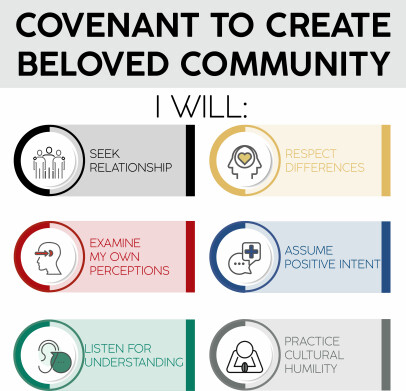 create more inclusion, diversity, equity and antiracism (IDEA) or less. This 8-session course will focus on six actions that you and community partners can take to grow in building beloved community and hence create spaces of belonging and becoming.
create more inclusion, diversity, equity and antiracism (IDEA) or less. This 8-session course will focus on six actions that you and community partners can take to grow in building beloved community and hence create spaces of belonging and becoming.
You will learn how to have contextual brave conversations that matter, learn evidence-based strategies for bias reduction, become rooted in Theological and Wesleyan principles that undergird this work, and participate in brief spiritual practices that are designed to deepen your capacity to better build bridges, heal divisions and participate in holy reconciliation as disciples of Jesus Christ.
May we journey well together for the glory of God.
The upcoming iteration of the program will be announced soon.
Learn More
Whether you are a seasoned advocate for justice, a beginner and/or curious learner who is discerning your next faithful step, these actions will catalyze a heartset, mindset and skill set that allows you to better build bridges, heal divisions and participate in holy reconciliation.
The work and ministry of building an inclusive, diverse, equitable, beloved community that promotes antiracism isn’t separate from our discipleship but integral. It isn’t a partisan issue, but a Gospel mandate. We are not introducing new commitments. We are offering a strategic, just, relevant, intentional and adaptive framework for reclaiming who God has created us to be.
Dismantling racism or other systems of oppression can often be overwhelming and eternal. Yet, it is wholly necessary and essential. Therefore, this course seeks to replace overwhelm with inspiration and provide information and intentional practices that are doable.
Course Outline & Outcomes
Orientation
Module 1: Seeking Relationships
Module 2: Examining our Perceptions
Module 3: Listening for Understanding
Module 4: Respecting Differences
Module 5: Assuming Positive Intent
Module 6: Growing in Cultural Humility
Celebration and Next Steps
You will gain:
• Theological and Wesleyan Principles for Building Beloved Community via the Great Commandment, the Great Commission, UMC Constitution and Social Principles, and Wesleyan theology.
• Tools for Engaging in Brave Conversations
• Resources for understanding and reducing Implicit Bias
• IDEA Practices for becoming an Inclusion, Diversity, Equity, Antiracism (IDEA) disciple of Jesus Christ.
• Resources for being an empathic leader
• An introduction to a model that helps individuals and organizations identify how to move from an monocultural mindset to a intercultural mindset that includes cultural humility.
• Information and language to better create systems of equity and spaces of belonging.
• Tools to identify your next faithful step within your context.
Syllabus
Click Here for the Course Curriculum Outline & Schedule
Subject Area Experts
The Baltimore-Washington Conference has been blessed by the work of several subject matter experts from different fields and perspectives toward a common goal: racial justice and increased multicultural competency. They have worked with staff, conference leaders, the Board of Ordained Ministry, and/or pastors and laity. We invited four of them to help lead this course
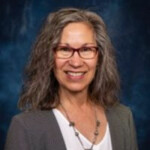 Kristina Gonzalez has worked with the Baltimore-Washington Conference as a coach and trainer since 2016. She brings with her deep understanding of how this work intersects with the life of the church and currently serves as the Director of Innovation for an Inclusive Church for the Greater Northwest Episcopal Area of the UMC (GNW)
Kristina Gonzalez has worked with the Baltimore-Washington Conference as a coach and trainer since 2016. She brings with her deep understanding of how this work intersects with the life of the church and currently serves as the Director of Innovation for an Inclusive Church for the Greater Northwest Episcopal Area of the UMC (GNW)
.
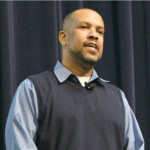 Dushaw Hockett has worked with the Baltimore-Washington Conference for over 7 years equipping congregational leaders to faithfully build Beloved Community in the 21st century. Using his facilitation skills and expertise as a national leader in this area, he has led several BWC immersion experiences to include: Beloved Community, Equity 2.0 cohorts and IDEA (inclusion, diversity, equity and antiracism) practitioner training. Hockett is the founder and Executive Director of Safe Places for the Advancement of Community and Equity (SPACEs), a Washington, DC-based leadership development and technical assistance organization dedicated to bridging the gap between what people imagine and what they achieve. A native New Yorker who now resides in Maryland, Dushaw has over 20 years of experience in training, community building and organizational development.
Dushaw Hockett has worked with the Baltimore-Washington Conference for over 7 years equipping congregational leaders to faithfully build Beloved Community in the 21st century. Using his facilitation skills and expertise as a national leader in this area, he has led several BWC immersion experiences to include: Beloved Community, Equity 2.0 cohorts and IDEA (inclusion, diversity, equity and antiracism) practitioner training. Hockett is the founder and Executive Director of Safe Places for the Advancement of Community and Equity (SPACEs), a Washington, DC-based leadership development and technical assistance organization dedicated to bridging the gap between what people imagine and what they achieve. A native New Yorker who now resides in Maryland, Dushaw has over 20 years of experience in training, community building and organizational development.
 K Scarry partnered with the BWC to create a multiplicative series of brave conversations known to us as “Mapping a Path to Racial Justice.” And, she has offered a youth centered version of this work in our virtual ROCK youth retreat breakout session. Driven by a conviction that people should have consistent space where they are welcomed in, K launched an open community meal in her hometown a few years ago that continues today. Before joining The People’s Supper team, she worked in a number of non-profit organizations exploring different manifestations of community: with women coming out of sex trafficking, in a fraternity house, as an associate pastor, and as a chaplain in a maximum security women's prison.
K Scarry partnered with the BWC to create a multiplicative series of brave conversations known to us as “Mapping a Path to Racial Justice.” And, she has offered a youth centered version of this work in our virtual ROCK youth retreat breakout session. Driven by a conviction that people should have consistent space where they are welcomed in, K launched an open community meal in her hometown a few years ago that continues today. Before joining The People’s Supper team, she worked in a number of non-profit organizations exploring different manifestations of community: with women coming out of sex trafficking, in a fraternity house, as an associate pastor, and as a chaplain in a maximum security women's prison.
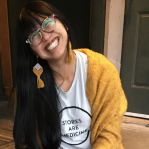 Mary Pauline Diaz-Frasene (she/her) is a Community Manager with the People's Supper, partnering with communities nationwide to design dialogues across lines of difference and rupture. Her previous work includes justice and service ministry/organizing with Catholic churches in Seattle, and she serves as an appointee on the Racial Justice and Cultural Diversity Commission for the Roman Catholic Archdiocese in western Washington state. Mary Pauline is pursuing a Masters of Arts in Theology and Culture at The Seattle School of Theology and Psychology with training in hospital chaplaincy. She is a Pilipina-American from an immigrant family, raised in Colorado and living in Seattle, and she loves seeing people recognize their own gifts and celebrate them together.
Mary Pauline Diaz-Frasene (she/her) is a Community Manager with the People's Supper, partnering with communities nationwide to design dialogues across lines of difference and rupture. Her previous work includes justice and service ministry/organizing with Catholic churches in Seattle, and she serves as an appointee on the Racial Justice and Cultural Diversity Commission for the Roman Catholic Archdiocese in western Washington state. Mary Pauline is pursuing a Masters of Arts in Theology and Culture at The Seattle School of Theology and Psychology with training in hospital chaplaincy. She is a Pilipina-American from an immigrant family, raised in Colorado and living in Seattle, and she loves seeing people recognize their own gifts and celebrate them together.
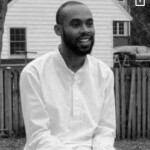 Rev. Dr. Kendrick D. Weaver is our Podcast Leader. He holds a Doctor of Ministry in Christian Spirituality from Washington Theological Union and has studied meditation with Jesuits and Carmelites. Dr. Weaver is an ordained elder in The United Methodist Church and has been instrumental in shaping deeply contemplative leaders. He currently serves as the pastor of Union United Methodist Church in Upper Marlboro, Maryland— a revitalized niche community and contemplative church that Rev. Weaver has served for the last eight years. This historically black church (154 years old) resonates with and reflects Howard Thurman’s models for blending a growing multiracial community with a shared commitment to a contemplative life. Rev. Weaver also provides training in spirituality at conferences, retreats, and other venues and is founder of the Sleeping with God Meditation Center. He is the author of six books, including the best-selling work, Meditate Like Jesus: Uncover the Meditative Practices of Jesus. He holds degrees in philosophy, divinity, and Christian spirituality, as well as certifications in meditation.
Rev. Dr. Kendrick D. Weaver is our Podcast Leader. He holds a Doctor of Ministry in Christian Spirituality from Washington Theological Union and has studied meditation with Jesuits and Carmelites. Dr. Weaver is an ordained elder in The United Methodist Church and has been instrumental in shaping deeply contemplative leaders. He currently serves as the pastor of Union United Methodist Church in Upper Marlboro, Maryland— a revitalized niche community and contemplative church that Rev. Weaver has served for the last eight years. This historically black church (154 years old) resonates with and reflects Howard Thurman’s models for blending a growing multiracial community with a shared commitment to a contemplative life. Rev. Weaver also provides training in spirituality at conferences, retreats, and other venues and is founder of the Sleeping with God Meditation Center. He is the author of six books, including the best-selling work, Meditate Like Jesus: Uncover the Meditative Practices of Jesus. He holds degrees in philosophy, divinity, and Christian spirituality, as well as certifications in meditation.
Course Design
This course has self-directed (asynchronous) content and activities as well as facilitated zoom (synchronous) conversations. Excluding the weeks for the Orientation and Celebrations & Next Steps Meetings, the course content is designed to run for 6 weeks. The purpose of our facilitated zoom time is to provide you with the opportunity to practice, connect, debrief, and go deeper in your learning with other sojourners. Each week will look a bit different depending on the topic of the week, but the essence and purpose of these live sessions remain the same: to learn and grow together in community.

Facilitated Zoom Sessions (accessed through Assembly) are held on Thursday's from 7-8:30 PM ET. New dates will be announced soon.
Time Commitment
The time commitment is approximately 3 hours per week. Self-directed content on the Assembly learning platform is designed to take about 75 - 90 minutes of your time and can be done as desired before each Zoom discussion session. This content includes a 2.5 minute daily podcast to deepen each weekly practice. Facilitated Zoom Sessions are 90 minutes.
What are IDEA practices?
IDEA stands for Inclusion, Diversity, Equity and Antiracism. These practices--combined with our deep identity as beloved children of God--create spaces where all are respected as sacred, worthy, equal and loved.
There are several evidence-based strategies to reduce bias. Throughout this study, we will explore at least six of them. and not necessarily in the order that Dushaw names them. This curriculum will explore the following practices.
• Individuation. Take the time to learn detailed information about people who are different; or, you perceive them to be.
• Perspective Taking. Identify and practice creative ways to ‘walk in the shoes’ – metaphorically speaking – of the other or perceived other.
• Intergroup Contact. Engage in meaningful and ongoing contact across lines of difference.
• Fluency in the Language (individual/interpersonal). Become fluent in the language of race, equity and othering.
• Applies an Equity Lens – (organizational + societal). Talk about equity/racial equity (and applies an equity lens) in ways that are compelling and transformative; this includes using a “targeted universalism” framework to advance equity; and using Racial Equity Impact Assessments (or REIAs) to evaluate proposed policies; as well as using REIAs proactively to craft future policy.
• Knows the History of Race, Racism + Othering. Develop a functional understanding of the history of race + racism + other forms of othering; and practices 3 Rs -- repair, remembrance, and reimagining – as a result.
By taking these various steps, we can begin to implement and embody behaviors that include all persons at all times, encourage diversity for the value and wealth of knowledge that comes with differences, do what is right an ensure equity and equal access is not just spoken but lived, and partake in the affirmation of race and ethnicity by being anti-racist in all of our ways.
How can the Podcast deepen my experience?
For each day of the course, we have provided a short podcast that we invite you to use as a way to start your day and keep the ideas of each week forefront in your mind, heart, and prayers. These 2-3 minutes meditative moments can help deepen our experience and capacity for this sacred work by creating time for centering, quiet and reflection. Each morning, you will receive email notifications with a link directly to the podcast content, so you will be able to access it from your email or by going into the course site on Assembly.
The podcast portion of this experience aims to tap gently on the door of the heart through daily meditations. Their forms and styles vary throughout the weeks but each podcast meditation includes breath work, chanting, imagery and affirmations. Seeking to engage the whole person, these meditative moments are first and foremost designed to be experienced, rather than analyzed. We hope that these moments will entice you, the listener, to open (ever so slightly) that unconscious and subconscious part that is needed for any true change to take root.
